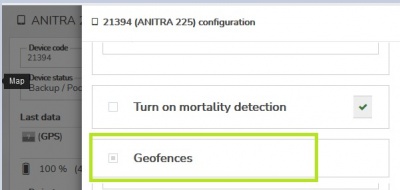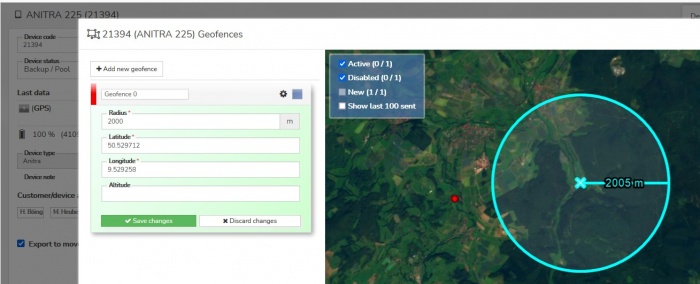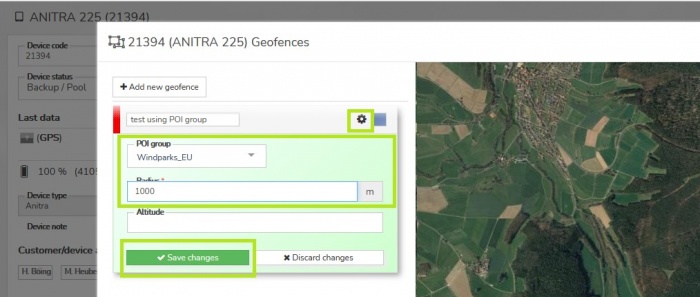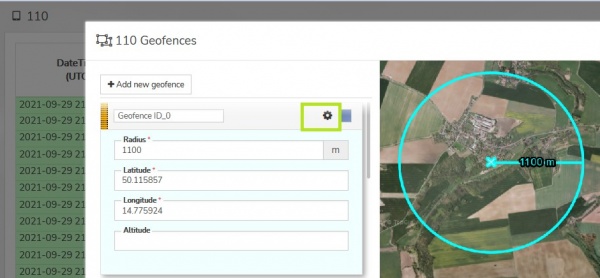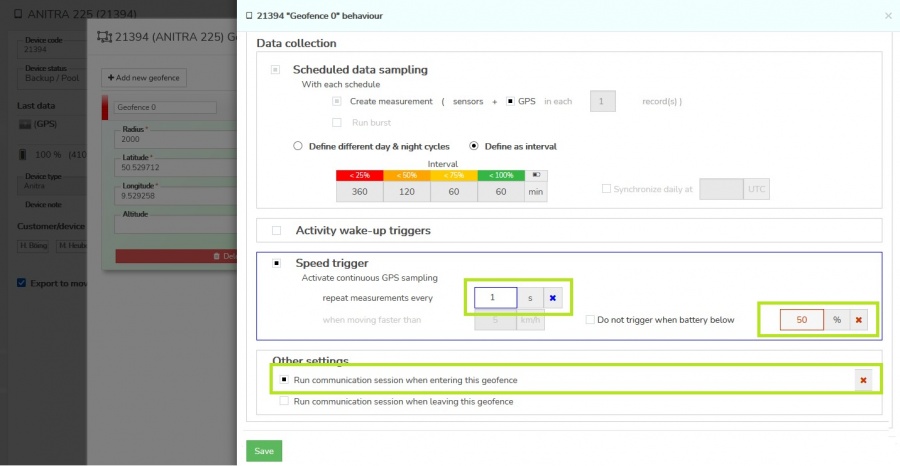GEOFENCING
Geofences (GF) modify a standard device behavior based on the geographic location. Whenever the device enters the defined area its behavior switches to the geofence version.
Contents
Specifics of Anitra geofencing
- tailored for very advanced geofencing tasks on top of POI databases with even many thousands of items (e.g. database of past poisoning places, wind turbines, dangerous power pylons, etc)
- geofences defined by circular (or possibly even cylindrical) zones
- working with circles allows resolving conflicts for overlapping geofences (as the closest, the smallest)
- altitude definition enables 3D geofencing (when higher it is considered as outside of geofence)
- a dynamic geofence synchronization (when moving the tag synchronizes 100 closest geofence instances)
Geofence creation and states
- For configuring GF click the „geofences“ section in the device configuration screen
- Note the geofencing functionality was significantly reshaped and only devices with device firmware updated to the latest versions can use this feature. If you do not see the „geofences“ section in your configuration screen please consult us if your device can possibly use this functionality.
- Dedicated screen showing list of GF on the left side and a map of those on the right
- GF definition consists of
- spatial definition (Latitude, Longitude, Radius/Range, and Altitude)
- behavior configuration for the geofenced area
Geofence spatial definition
- it can be configured in two distinct ways/modes:
- employing POI group using the „Link to POI database“ option
- list the existing POI group (note this requires you to have defined some POIs and POI groups previously – see the dedicated section of Anitra documentation
- latitude and longitude definitions are used from POIs in the group and you only need to define the radius valid for all the POIs
- save and proceed to behavior definition
- employing POI group using the „Link to POI database“ option
Geofence behavior definition
- Modified behavior for geofence can be defined in the Geofence behavior screen.
- A simplified configuration screen to manage geofence parameters is shown
- currently valid configuration is displayed as a background
- GF parameters overriding standard configuration can be set and saved
- a similar editing logic as for standard configuration is implemented here – i.e draft modifications (blue) and already saved values (red)
- Only a subset of all configuration parameters is available for the geofence definition
- day/night data collection interval
- activity and speed triggering
- radio buoy activation
- communication while entering/leaving the geofence
- Select the GF in the left list of in the map to locate it in the map nad vice versa
- Geofences can have the following states
- new: a geofence with spatial definition but no behavior defined yet
- inactive/disabled: a complete GF definition ready to be activated, allows temporary disabling GF and reenabling later when needed
- active: only in this state, the GF definition is actually submitted to the device!
- you can change the GF states using buttons („save“, „activate“, „disable“, „delete“) – relevant buttons appear when clicking at the GF in the list
- save – saves the modified definition
- activate – activates prepared definition and submits it to the device in the next communication session
- you can change the GF states using buttons („save“, „activate“, „disable“, „delete“) – relevant buttons appear when clicking at the GF in the list
- access GF edit mode double-clicking the geofence in the left GF column
- you can manuály modify the original spatial definition retyping the values of latitude, Longitude, Radius or Altitude
- you can also custom name the geofence
- access behavior definition clicking a cogwheel icon
- use Escape key for closing „edit mode“
- access GF edit mode double-clicking the geofence in the left GF column
groups
